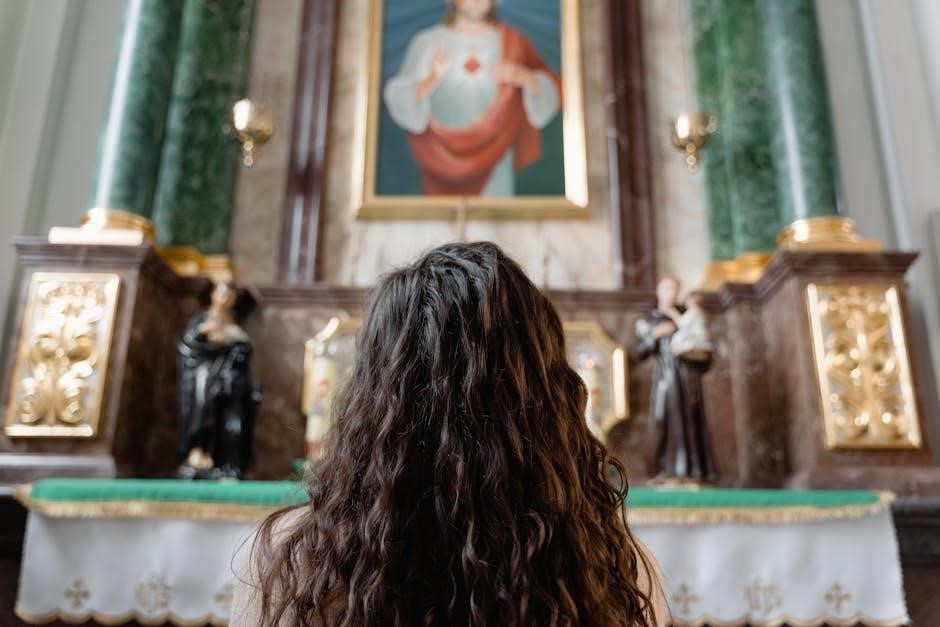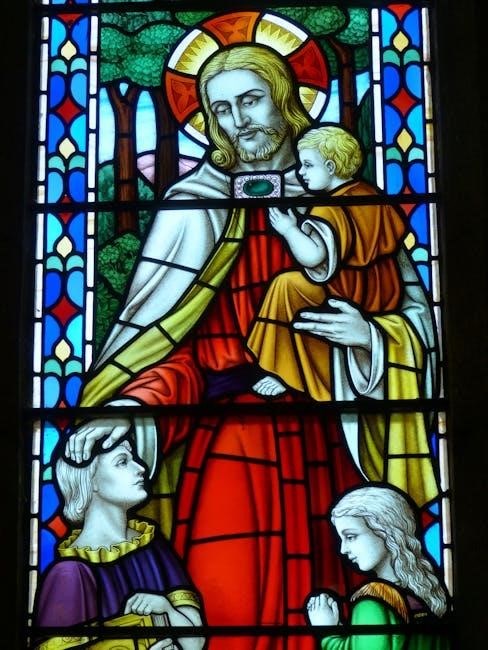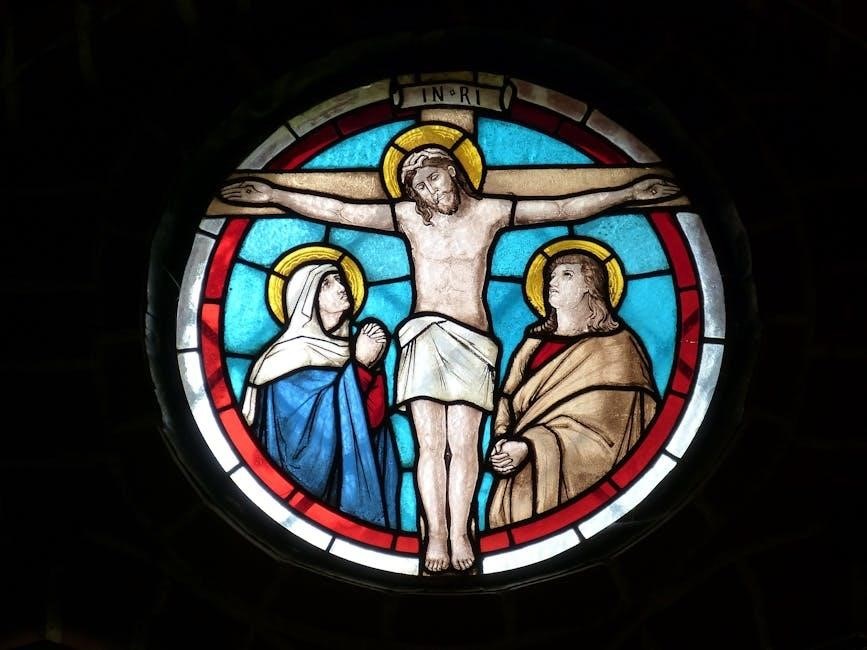El Niño Jesús No Odia a Los Mariquitas PDF: Understanding the Context and Significance
This phrase sparks discussions about faith, identity, and inclusion, aiming to challenge stereotypes and promote acceptance within religious communities, while fostering dialogue on LGBTQ+ rights and spirituality.
The phrase “El Niño Jesús No Odia a Los Mariquitas” translates to “Baby Jesus Does Not Hate Gays,” sparking conversations about faith, identity, and inclusion. Originating in Latin America, it challenges traditional religious views on LGBTQ+ individuals, emphasizing love over judgment. The phrase gained traction through its use in art, activism, and literature, becoming a symbol of resistance against discrimination. It reflects broader debates about reinterpretation of religious teachings in modern society. The PDF titled El Niño Jesús No Odia a Los Mariquitas serves as a resource for understanding this movement, blending theology, culture, and personal narratives to advocate for acceptance and equality within faith communities.

Historical Background of the Phrase
The phrase “El Niño Jesús No Odia a Los Mariquitas” emerged as a response to the often contentious relationship between religious doctrine and LGBTQ+ identity. Rooted in Latin American culture, where Catholicism holds significant influence, the phrase challenges traditional interpretations of faith that have historically marginalized LGBTQ+ individuals. It gained prominence in the late 20th century as a rallying cry for inclusion and acceptance within religious spaces. The phrase reflects the broader struggle to reconcile religious teachings with modern understandings of diversity and human rights. Its origins are tied to grassroots activism and artistic expression, becoming a symbol of resistance against homophobic interpretations of scripture. The phrase has since been widely shared, sparking both support and controversy, while inspiring dialogue about faith and identity.

The Theological Debate Surrounding the Phrase

The phrase sparks intense theological debate, challenging traditional religious views on LGBTQ+ issues by advocating for love and acceptance, while critics insist on adherence to specific biblical teachings they believe condemn homosexuality.
Jesús and the LGBTQ+ Community in the New Testament

Exploring the New Testament, Jesús’ teachings emphasize love, compassion, and acceptance, yet his direct stance on LGBTQ+ issues remains absent. Scholars argue that Jesús’ message of inclusion, as seen in parables like the Good Samaritan, reflects a broader embrace of marginalized groups. However, interpretations of scripture often fuel debates, with some citing passages like Romans 1:26-27 or Leviticus 18:22 to condemn same-sex relationships, while others emphasize Jesús’ lack of explicit condemnation. This theological tension highlights the complexity of reconciling ancient texts with modern understandings of sexuality. Many in the LGBTQ+ community find solace in Jesús’ teachings of love and grace, while others struggle with doctrines that seem exclusionary. This duality underscores the ongoing struggle to reconcile faith and identity within religious traditions.
Modern Interpretations and Controversies
Modern interpretations of the phrase “El Niño Jesús No Odia a Los Mariquitas” have sparked intense debate, particularly within religious and LGBTQ+ communities. Progressive religious groups argue that the phrase reflects Jesús’ teachings of unconditional love, challenging traditional interpretations that exclude LGBTQ+ individuals. Conversely, conservative factions view it as a misrepresentation of scripture, emphasizing biblical passages often cited to condemn same-sex relationships. This duality has fueled controversy, with some accusing advocates of rewriting religious doctrine, while others see it as a necessary step toward inclusivity. The phrase has become a rallying cry for LGBTQ+ advocacy within faith communities, highlighting the tension between tradition and modern understandings of sexuality and spirituality. This ongoing debate underscores the broader struggle to reconcile religious teachings with contemporary values of equality and acceptance.

Cultural and Social Implications
The phrase challenges stereotypes, fostering dialogue on faith, identity, and inclusion, while emphasizing the need for cultural shift and social progress toward LGBTQ+ acceptance and equality.
The Role of Religion in Shaping Attitudes Toward LGBTQ+ Individuals

Religion has long influenced societal attitudes toward LGBTQ+ individuals, often fueling discrimination through interpretations of sacred texts. However, progressive religious movements emphasize inclusivity, challenging harmful doctrines. The phrase “El Niño Jesús No Odia a Los Mariquitas” reflects this shift, advocating for a faith that embraces diversity and rejects bigotry. By reinterpreting religious teachings, it encourages followers to see LGBTQ+ individuals through a lens of love and acceptance rather than condemnation. This theological evolution highlights the transformative power of faith in fostering equality and combating prejudice, urging believers to align their values with compassion and human dignity.
Advocacy and Activism Within the LGBTQ+ Community
Advocacy and activism within the LGBTQ+ community have been pivotal in challenging oppressive systems and promoting equality. The phrase “El Niño Jesús No Odia a Los Mariquitas” has become a rallying cry, inspiring activists to use faith as a tool for liberation rather than exclusion. Grassroots movements and organizations leverage such messages to counter religious-based discrimination and advocate for inclusive policies. Personal stories of resilience and faith journeys are central to this activism, fostering empathy and understanding. By engaging in interfaith dialogues and challenging harmful interpretations of religious texts, the LGBTQ+ community continues to reclaim spiritual spaces, ensuring that faith communities embrace diversity and uphold the dignity of all individuals.

Personal Stories and Testimonies
Personal stories and testimonies highlight individual journeys of acceptance and rejection, showcasing how faith intersects with identity and the transformative power of love and understanding.

Voices from the LGBTQ+ Community: Stories of Faith and Acceptance
Members of the LGBTQ+ community share powerful stories of navigating faith and identity, often finding strength in their spirituality despite societal challenges.
These narratives reveal journeys of self-discovery, highlighting how interpretations of religious teachings can either harm or heal.
Many emphasize the importance of inclusive spaces where faith and sexuality are not seen as conflicting but as complementary aspects of their humanity.
Through personal testimonies, individuals illustrate the transformative power of acceptance and the resilience required to reconcile their faith with their identity.
These stories serve as a testament to the human spirit’s capacity for love, forgiveness, and growth, offering hope for a more inclusive future.
Challenges and Triumphs: Navigating Faith and Identity
Navigating faith and identity remains a profound challenge for many LGBTQ+ individuals, often marked by rejection, self-doubt, and societal expectations.
Religious teachings, sometimes interpreted as exclusionary, can deepen internal conflicts, forcing individuals to question their worth and place within their faith communities.
Yet, many find triumph through resilience, rediscovering spiritual strength and reinterpreting sacred texts in ways that affirm their identity and humanity.
Support systems, including affirming religious groups and allies, play a crucial role in helping individuals reconcile their faith and sexuality.
These journeys of self-acceptance not only empower individuals but also inspire broader change, challenging religious institutions to embrace inclusivity and love.
Ultimately, the triumph lies in living authentically, proving that faith and identity are not mutually exclusive but deeply intertwined aspects of the human experience.
The phrase challenges stereotypes, advocating for LGBTQ+ inclusion and fostering dialogue on faith and equality, envisioning a future where spirituality and diversity harmoniously coexist.
The Path Forward: Reconciling Faith and Equality
Reconciling faith and equality requires challenging traditional interpretations and fostering inclusive dialogue within religious communities. The phrase “El Niño Jesús No Odia a Los Mariquitas” serves as a catalyst for this conversation, emphasizing love and acceptance. By promoting education and empathy, society can bridge the gap between spiritual teachings and LGBTQ+ rights. Advocacy efforts must continue to push for policies that uphold equality while respecting religious freedom. Ultimately, the path forward lies in creating spaces where faith and identity coexist harmoniously, ensuring that no individual is marginalized due to their sexual orientation or gender identity. This journey demands courage, understanding, and a commitment to compassion.
